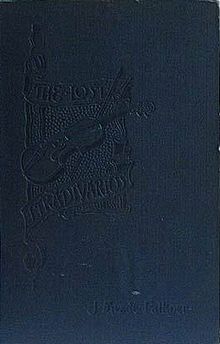The Lost Stradivarius: Difference between revisions
mNo edit summary |
Add to short lead |
||
| Line 23: | Line 23: | ||
}} |
}} |
||
'''''The Lost Stradivarius''''' (1895), by [[J. Meade Falkner]], is a short novel of ghosts and the evil that can be invested in an object, in this case an extremely fine [[Stradivarius]] violin. It has been described as a "psychic romance".<ref>''XIX Century Fiction'', Part I, A–K (Jarndyce, Bloomsbury, 2019).</ref> |
'''''The Lost Stradivarius''''' (1895), by [[J. Meade Falkner]], is a short novel of ghosts and the evil that can be invested in an object, in this case an extremely fine [[Stradivarius]] violin. It has been described as "one of Falkner's three celebrated novels" and as a "psychic romance".<ref>''XIX Century Fiction'', Part I, A–K (Jarndyce, Bloomsbury, 2019).</ref> |
||
==Previous owner's ghost== |
==Previous owner's ghost== |
||
Revision as of 13:29, 22 January 2020
 Cover of the first edition | |
| Author | J. Meade Falkner |
|---|---|
| Language | English |
| Genre | Horror novel |
| Publisher | William Blackwood |
Publication date | 1895 |
| Publication place | United Kingdom |
| Media type | Print (Hardback) |
| Pages | 296 pp |
The Lost Stradivarius (1895), by J. Meade Falkner, is a short novel of ghosts and the evil that can be invested in an object, in this case an extremely fine Stradivarius violin. It has been described as "one of Falkner's three celebrated novels" and as a "psychic romance".[1]
Previous owner's ghost
After finding the violin of the title in a hidden compartment in his college rooms, the protagonist, a wealthy young heir, becomes increasingly secretive as well as obsessed by a particular piece of music, which seems to have the power to call up the ghost of the violin's previous owner. Roaming from England to Italy, the story involves family love, lordly depravity, and the tragedy of obsession, all conveyed in a "high" serious tone not uncommon in late Victorian literature. Preceding M. R. James's ghost stories by several years, it has been called the novel James might have written, had he written novels.[2]
Broadcast
In August 2008, a Joanna David reading of the novel was broadcast on BBC Radio 7.[citation needed]
References
- ^ XIX Century Fiction, Part I, A–K (Jarndyce, Bloomsbury, 2019).
- ^ Bleiler, Everett (1948). The Checklist of Fantastic Literature. Chicago: Shasta Publishers. p. 112.
External links
- The Lost Stradivarius at Project Gutenberg
 The Lost Stradivarius public domain audiobook at LibriVox
The Lost Stradivarius public domain audiobook at LibriVox- "Review: The Lost Stradivarius, by J Meade Falkner". Vulpes Libris Blog. 10 January 2014.
- Brandstatter, Tasha (20 May 2012). "Review: The Lost Stradivarius by John Meade Falkner". The Project Gutenberg Project.
- Mackintosh, Paul St James (11 April 2015). "Book review: The Lost Stradivarius, by John Meade Falkner". TeleRead.com.
- Tallis, F. R. (13 July 2013). "Book of a lifetime: The Lost Stradivarius, By J Meade Falkner". The Independent.
